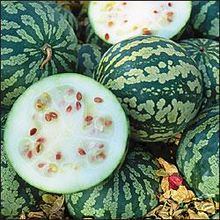- Citron melon
-
The citron melon (Citrullus lanatus), or tsamma, is thought to be the original/ancestral variety of watermelon. It is in the family cucurbit which consists of various squashes, melons, and gourds. Its fruit has a hard white flesh, rendering it less likely to be eaten raw; more often it is "pickled" or used to make preserves. It is especially useful for the latter, because it has a high pectin content.
History
The citron melon is native to Africa, probably the Kalahari desert, where it still grows abundantly. The time and place of its first domestication is unknown, but it appears to have been grown in ancient Egypt at least four thousand years ago.
It is grown as food in Africa, especially dry or desert regions, including South Africa. In some areas, it is even used as a source of water during dry seasons.
Today, it's not only found in Africa, but also domesticated in North America spanning much of the Southern US. There it is generally somewhat divergent from its "pure" form, in part from accidental crossbreeding with modern, domesticated watermelon. It is known in the southern plains states and Australia as pie melon, as well as citron melon. These impure, domesticated versions are sometimes oblong in shape, have unusually colored seeds or meat, or are otherwise different than the original form.
It has become a feral species, growing wild, in western Mexico.
Characteristics
The actual fruit of this plant resembles the more modern, domesticated watermelons, except it's smaller and more spheroid. The meat of the melon is more whitish and dense, though, and much stronger in flavor, akin more to the area on a domesticated watermelon where the red meat is just turning into the white rind. As noted above, while some people do eat it raw, it's more often cooked or prepared in some other way.
Citron melon leaves are palmate in the early stages of growth, and deeply lobed in later development. They have a rough texture and a visible white venation.
Solitary flowers with large, yellow petals of around 2-10 millimeters are randomly dispersed forming many seeded fruit with a variegated light green and dark green pattern.[1]
The citron melon should not be confused with actual citron, a citrus fruit originally used, since ancient Egypt, to repel insects, but which in modern times is also sold candied, or cooked into fruitcake.
See also
Melon Bailan melon • Bitter melon • Canary melon • Cantaloupe • Citron melon • Citrullus ecirrhosus • Cucumeropsis mannii • Galia • Hami melon • Honeydew • Horned melon • Melon ball • Montreal melon • Muskmelon • Paddy melon • Piel de Sapo • Santa Claus melon • Sprite melon • Sugar melon • Sun Melon • Watermelon • Watermelon steak • Winter melon • Yubari KingCategories:- Melons
Wikimedia Foundation. 2010.

